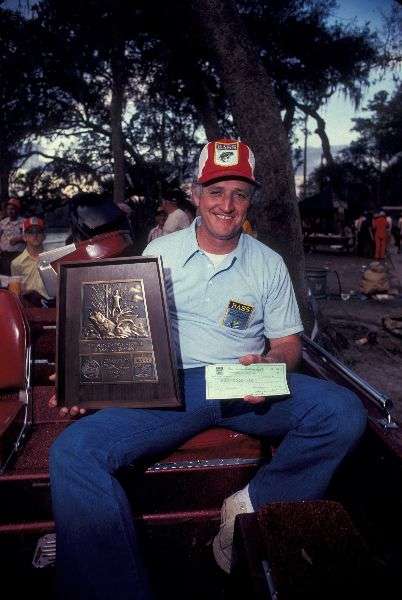
ESCANABA, Mich. — When you think of the Toyota Bassmaster Angler of the Year Award, you probably think of Roland Martin, Kevin VanDam, Bill Dance, Mark Davis and Aaron Martens — the guys who have won it and also posted other great seasons where they were in the hunt right to the end.
But just like the Billboard record charts, AOY has its share of flashes in the pan, or one-hit wonders. I'm not talking about the anglers who have won the award just once (there are 10 of them and they're all stars of the sport) but about guys who came on the scene to have a great year but never put it together again.
In the 44-year history of AOY, 23 anglers have finished in the Top 10 of AOY once but never placed in the Top 25 at any other time. Seven of them did it in 1970, the first year of the award. Mike Bono was third that year. Bill Adair and John Hadad tied for fourth. Harold Hays was 6th. R.C. Billingsley and Don Siebert tied for 8th. And Ralph Polly was 10th. None of them would ever make the Top 25 again.
But it was a different sport. The bass were the same, but the anglers were very different. "Professional" bass fishing didn't exist unless you were a guide or television host, and the men who fished the early tournaments were just taking a few days off from their real jobs. When Monday rolled around they were back in the store, behind the desk or in the field. None of those seven from 1970 would have called themselves a "professional fisherman." They probably would have laughed at the title. What's more, B.A.S.S. decided AOY on the basis of tournament earnings that year. If you finished in the top two or three of just one event, you were probably going to be top 10 at the end of the year.
So I don't think it's fair to call any of those guys one-hit wonders. They were pioneers. And like the pioneers of any sport, you get some participants in the early days who don't fit the mold, who don't continue in the sport and who don't really reflect the talent level to come.
Ditto for Al St. Romain (6th in '71), Pete Nosser (6th in '72) and David Lockhart (6th in '73). They were terrific anglers who came along early, when there were few opportunities to make a living as a pro angler, and they changed courses after a year or two on the trail.
Four of the 13 remaining anglers who could qualify for one-hit wonder status posted their top 10 AOY finish in the last four years. Obviously, they don't qualify as flashes in the pan since they're all young, have plenty of fishing ahead of them and could easily post other great years very soon.
That leaves us with just 9 names. But we can pare it down even more.
Roger Boler of Slidell, La., came on strong in 2003 when he was 4th in AOY. The Classic was on the Louisiana Delta that year, and because Boler was a local, he was a pre-tournament favorite to do well. It didn't work out that way, and he finished 48th. Boler has fished 55 events in his B.A.S.S. career and finished in the money 22 times. That's very respectable, and realistically takes him out of the "flash-in-the-pan" category.
Chuck Economou (8th in 2002) only had one really great season, but he qualified for a couple of Classics. That's not stellar, but it's certainly not bad.
Art Ferguson (5th in 2000) had one great year as a pro, but was solid several other times and remains the only angler ever to qualify for the Bassmaster Classic multiple times as an amateur through the B.A.S.S. Nation and multiple times as a pro.
Greg Hines (9th in 1989) qualified for three Classics in the '80s and '90s and has been a legend out west for more than 30 years.
Scott Suggs (7th in 2004) has gone on to a successful career with FLW and became the first (and thus far only) angler to win $1 million in a single tournament in 2007. One-hit wonders do not cash seven-figure checks!
Larry Williams (10th in 1985) only posted one top 10 season, but he was solid for more than a decade, qualifying for five Bassmaster Classics. He was no flash in the pan.
It wouldn't be fair to call of those six a one-hit wonder, so I won't do it here. In fact, without knowing more about the circumstances of a tournament pro, it might be unfair to call just about anyone a flash in the pan. There are lots of reasons to fish as a professional for a year or two and even more reasons to quit. Pro bass fishing is a tough way to make a living, and it's certainly not for just anybody who loves fishing and is good at it.
That leaves us with three names — my picks for the biggest flashes in the pan in AOY history.
Do I need an explanation or warning here? I think I probably do. If this were another sport, it would be different. In baseball or football or basketball or hockey it's common to talk and write about things like this, critiquing the top draft picks that never materialized or the rookies of the year who turned out to be busts or the guys who seemed to squander their talent. But in fishing, people often get all bent out of shape if you say something less than glowing about an angler they met at a gas station or fished with as a co-angler or who married their second cousin.
So before you write a post that criticizes me for labelling your buddy as a pro fishing flash in the pan, please keep this in mind: I don't care. Post away, but I don't care. If fishing is to be taken seriously as a sport we need to talk about it like a sport and talk about the anglers like they're athletes. You may agree with me on that or you may disagree — vehemently — but I don't care.
My comments are not intended to be personal. You and I may define that differently. To me, assessing someone's angling performance or career is not personal. It's professional. I'm not saying anything about them as human beings. I am not insulting their way of life or life choices, nor would I ever do that. I do not care if they are a dog person or (heaven forbid) a cat person. But I reserve the right to comment on their fishing career and performances. So if my calling someone a flash in the pan is going to irritate you, you should stop right here and look for a how-to story or touchy-feely profile. I occasionally write the former, but never the latter.
With that out of the way, here are three of the biggest flashes in the pan or one-hit wonders in bass fishing history … alphabetically. For one brief, shining season, these guys were among the best in the business.
Gary Alverson of Rossville, Ga., won the Florida Invitational on the St. Johns River in 1979. It was just his fourth B.A.S.S. tournament, and that year he was 8th in AOY and qualified for the Classic, where he finished a mediocre 17th (only 25 anglers qualified that year). In his career, Alverson fished 91 B.A.S.S. events, finishing in the money 24 times, but never regaining the form he displayed in '79.
Bill Bartlett of Lookout Mountain, Tenn., must have been a talented pro. I recall reading that he was a fishing guide. In 1988 he finished fifth in the AOY race and went to his first and only Bassmaster Classic, where he placed 11th. He was 32 — prime time for an up and coming pro angler. The '88 numbers were impressive, but it seems he couldn't maintain them. The next year he was back on the trail, but posted a lot of mediocre or worse finishes. His best event was the 1989 Megabucks tournament on the Harris Chain where he was fourth. Except for that, his remaining B.A.S.S. career was pretty lackluster — 58 events, but only 18 times in the money with five of those coming in that one great year.
J.D. Skinner of Birmingham, Ala., had two flashes of brilliance in 1974 — 8th place in the AOY race and 7th place in the Classic on Wheeler Lake. He also has a pretty cool claim to B.A.S.S. fame: he was the first angler to catch a 10-pound bass in a B.A.S.S. tournament — a 10-2 at the 1973 Florida Invitational on the St. Johns River. Overall, Skinner fished just 35 events and finished in the money 13 times, but in 1974 he was one of the best.

